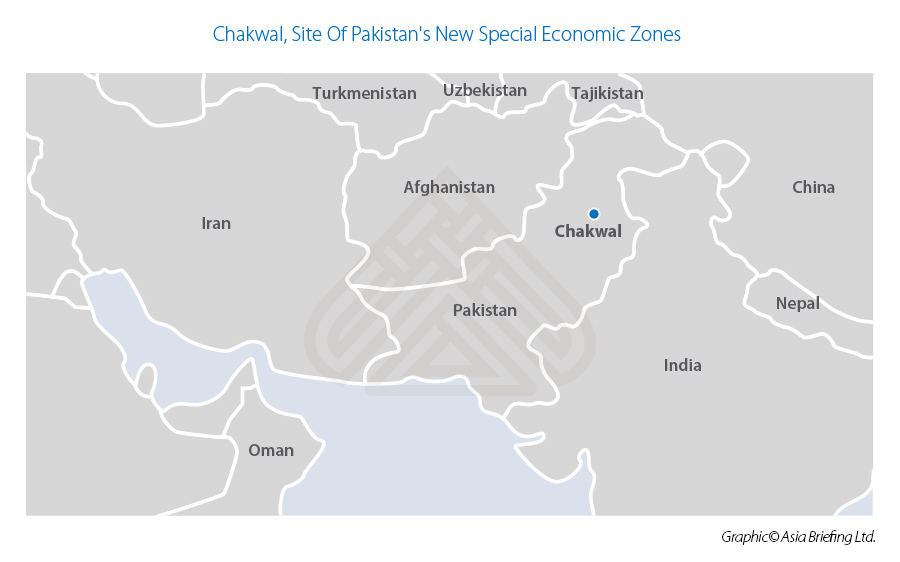Pakistan Opens Special Economic Zones For Healthcare Manufacturing In North Punjab
- Chakwal is located equidistant between Islamabad & Lahore
- Provides tax incentives for domestic and export production for healthcare in Central Asian and Middle Eastern markets
- Major Chinese manufacturing investment pouring in
Pakistan’s Dynamic Engineering and Automation (DEA), a privately owned engineering servicing company, has agreed with Chinese developers to build two Special Economic Zones (SEZs) at Pir Phato, and Thatta & Padshahan, of the Chakwal region of North Punjab. The project falls under the classification of the CPEC Healthcare Sector in Pakistan under the Belt and Road Initiative.
The development concludes negotiations with Chinese investors and companies to establish manufacturing facilities, global service centers, R&D labs, and sales centers with an estimated investment of US$5-7 billion.
The master layout plan of the SEZs is being prepared by the China Urban-Rural Holding Group, which specializes in rural and urban revitalization, eco-friendly designs, and implementation of balanced development of regions in China.
Chakwal District is located in the state of Rawal Pindi in the Punjab. Its capital city, also known as Chakwal, is 90 km south-east of the State capital, Islamabad, and 270km from the provincial capital, Lahore.
It is consequently ideally located to service both major metropolises in addition to providing regional support and opportunities for export production to the Central and Middle East – north via Afghanistan to Uzbekistan and south through Gwadar Port.

Several Chinese MNC’s have confirmed their investment plans in the two SEZs which have been launched to promote Foreign Direct Investment (FDI) in line with the vision of Prime Minister (PM) Imran Khan, DEA CEO Owais Mir said yesterday.
“We have signed agreements with Shenyang Biotech Group, Neusoft Medical Systems, HE Vision Group, Lovol Heavy Industries, Wondfu Medical, Kaper Technologies, Green Agrotech, Shenglin Metallurgical Group, Red Crown Intelligent Technology, Shanghai Rich Tai Industries and Dandong Automation to act as the local partners and facilitators.” he told the media.
Chinese investors intend to establish industries in the medical sector, metals recycling, automobile including EV, paint, marbles, agriculture and farming, renewable energy, paper recycling, artificial intelligence in the SEZs.
“These initiatives would generate employment and business activities in the henceforth neglected rural areas,” Mir added.
In health care initiatives, the DEA is collaborating with HE Vision China to build a state-of-the-art eye hospital that will be fully equipped with advanced technology. The hospital aims to provide free of cost eye treatments and checkups in the less privileged poor areas.
Mir said that DEA was already providing energy solutions, such as Synthetic Natural Gas (SNG) and LNG equipment services in Pakistan and focusing on healthcare, manufacturing, and industrial parks development in the country.
Pakistan’s new SEZ law allows the creation of industrial clusters with liberal incentives, infrastructure facilities, tax reliefs and investment facilitation services to enhance productivity and ease in doing business through a one window operation.
Pakistan has an urgent need to improve its health infrastructure. The Pakistani Board of Investment on Industrial Cooperation under CPEC has stressed the need for the development of Smart SEZs and is providing incentives to promote the establishment of Pakistani-Foreign Joint Ventures between local and foreign firms.
The fact that Chinese investors are piling in should be a major source of comfort to investors from the Middle East more familiar with the nuances of investing in the region. With the prospects of a trans-Afghan rail now coming to fruition, China’s involvement in the development of CPEC and the longer term, if occasionally arduous task of obtaining peace through trade seem now to be gaining serious commercial traction.
Related Reading
- Uzbekistan Re-Energizing as Central Asia’s Traditional Hub for the Silk Belt and Road
- Belt And Road CPEC Projects In Pakistan That Financiers & Investors Should Be Looking At
About Us
Silk Road Briefing is written by Dezan Shira & Associates. The firm has 28 offices throughout Asia, and assists foreign investors into the region. For strategic advisory and business intelligence issues please contact the firm at silkroad@dezshira.com or visit www.dezshira.com





